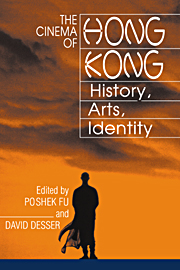Book contents
- Frontmatter
- Contents
- List of Contributors
- Acknowledgments
- Introduction
- Chronology of Hong Kong Cinema
- PART I HISTORY
- PART II ARTS
- 5 Richness through Imperfection: King Hu and the Glimpse
- 6 Space, Place, and Spectacle: The Crisis Cinema of John Woo
- 7 Besides Fists and Blood: Michael Hui and Cantonese Comedy
- 8 The Film Work of Ann Hui
- PART III IDENTITY
- Index
7 - Besides Fists and Blood: Michael Hui and Cantonese Comedy
Published online by Cambridge University Press: 05 June 2012
- Frontmatter
- Contents
- List of Contributors
- Acknowledgments
- Introduction
- Chronology of Hong Kong Cinema
- PART I HISTORY
- PART II ARTS
- 5 Richness through Imperfection: King Hu and the Glimpse
- 6 Space, Place, and Spectacle: The Crisis Cinema of John Woo
- 7 Besides Fists and Blood: Michael Hui and Cantonese Comedy
- 8 The Film Work of Ann Hui
- PART III IDENTITY
- Index
Summary
THE IMAGE OF HONG KONG CINEMA IN THE UNITED STATES
Hong Kong cinema began to gain popularity in the United States in the 1970s primarily through the English dubbed-versions of kung fu films. Before that time, kung fu films appealed only to a relatively small audience of martial arts fans and Chinatown immigrants, who managed to provide a stable market for these inexpensive films. Even though by 1979 the genres of kung fu (and wuxia) had been largely replaced by comedy in Hong Kong, they continued to be the Hong Kong cinema best known to the general audience of the United States up to this date.
During the early 1980s, several film festivals in the West, including the Edinburgh Film Festival and the New York Film Festival, discovered a few interesting films from Hong Kong. In 1982, Boat People (directed by Ann Hui), which was already a box-office hit in Hong Kong, was screened at the New York Film Festival and elicited unusual attention from critics for its (perceived) political content and its production quality. The film is the story of a Japanese journalist's unsuccessful attempt to rescue a South Vietnamese Chinese woman on the eve of the Communist takeover of South Vietnam. By taking on a wartime melodrama, the film exhibited a non–kung fu version of Hong Kong cinema that was unfamiliar to Western spectators.
- Type
- Chapter
- Information
- The Cinema of Hong KongHistory, Arts, Identity, pp. 158 - 175Publisher: Cambridge University PressPrint publication year: 2000



